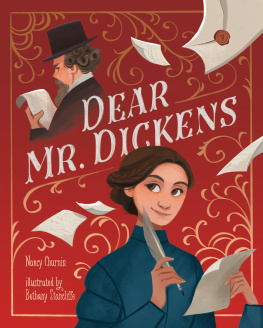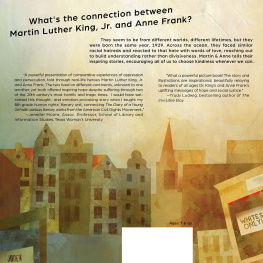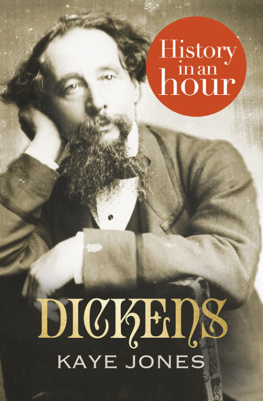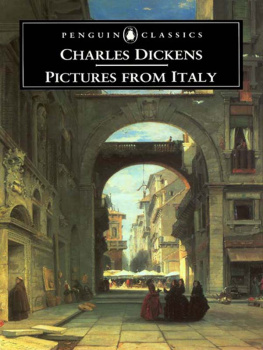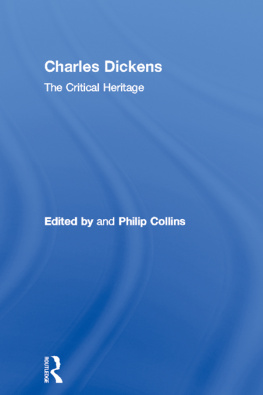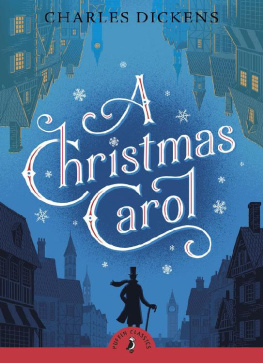Nancy Churnin - Dear Mr. Dickens
Here you can read online Nancy Churnin - Dear Mr. Dickens full text of the book (entire story) in english for free. Download pdf and epub, get meaning, cover and reviews about this ebook. year: 2021, publisher: Albert Whitman & Company, genre: Art. Description of the work, (preface) as well as reviews are available. Best literature library LitArk.com created for fans of good reading and offers a wide selection of genres:
Romance novel
Science fiction
Adventure
Detective
Science
History
Home and family
Prose
Art
Politics
Computer
Non-fiction
Religion
Business
Children
Humor
Choose a favorite category and find really read worthwhile books. Enjoy immersion in the world of imagination, feel the emotions of the characters or learn something new for yourself, make an fascinating discovery.
- Book:Dear Mr. Dickens
- Author:
- Publisher:Albert Whitman & Company
- Genre:
- Year:2021
- Rating:5 / 5
- Favourites:Add to favourites
- Your mark:
- 100
- 1
- 2
- 3
- 4
- 5
Dear Mr. Dickens: summary, description and annotation
We offer to read an annotation, description, summary or preface (depends on what the author of the book "Dear Mr. Dickens" wrote himself). If you haven't found the necessary information about the book — write in the comments, we will try to find it.
Dear Mr. Dickens — read online for free the complete book (whole text) full work
Below is the text of the book, divided by pages. System saving the place of the last page read, allows you to conveniently read the book "Dear Mr. Dickens" online for free, without having to search again every time where you left off. Put a bookmark, and you can go to the page where you finished reading at any time.
Font size:
Interval:
Bookmark:
With gratitude for my dear friends, Professor J. Don Vann, Professor Emeritus of the
University of North Texas, and his lovely wife, Dolores Vann, for teaching me about
Charles Dickens and living Dickenss words: A loving heart is the truest wisdomNC
To my wonderful family and friendsBS
Library of Congress Cataloging-in-Publication data is on file with the publisher.
Text copyright 2021 by Nancy Churnin
Illustrations copyright 2021 by Albert Whitman & Company
Illustrations by Bethany Stancliffe
First published in the United States of America in 2021 by Albert Whitman & Company
ISBN 978-0-8075-1530-3 (hardcover)
ISBN 978-0-8075-1529-7 (ebook)
All rights reserved. No part of this book may be reproduced or transmitted in
any form or by any means, electronic or mechanical, including photocopying,
recording, or by any information storage and retrieval system, without
permission in writing from the publisher.
Printed in China
10 9 8 7 6 5 4 3 2 1 WKT 26 25 24 23 22 21
Design by Aphelandra
Endpaper pattern by Garry Killian/Freepik
For more information about Albert Whitman & Company,
visit our website at www.albertwhitman.com.
T hink of someone famous you admire. What would
you do if that person said or wrote something unfair?
Would you speak up?
Would you risk getting that person angry?
Eliza Davis did.
Charles Dickens was the most famous writer of Elizas time.
English people from all walks of life eagerly paid two pence for his
weekly magazine, All the Year Round , to read the latest
installments of his stories. Later hed publish the
stories as books that passengers bought at
bookshops and railway stations.
But what made Charles Dickens a hero in Elizas eyes is
that he used the power of his pen to help others. When he
wrote about children forced to labor in workhouses, people
demanded change. When his readers were moved to tears
by tales of families struggling in desperate, dirty conditions,
they gave what they could to charities. As did Eliza.
Yes, Dickens had a
heart as big as England,
overflowing with
compassion for everyone.
Except
Eliza remembered when she read Dickenss book Oliver
Twist , about a poor orphan. She had loved it at firstuntil
she got to Chapter Eight, where she read about the old
shriveled Jew teaching Oliver to steal.
Eliza was Jewish.
Charles Dickens described the Jew as dishonest,
selfish, cruel, and ugly. The characters name was Fagin,
but over and over Dickens wrote the Jew , the Jew , the Jew .
Each time, the word hurt like a hammer on Elizas heart.
England was already a difficult place for Jewish people in the 1860s.
Many jobs were closed to them. They didnt have the right to vote or to
study or work at universities. If people thought that all Jews were like
Fagin, would Jewish people ever be treated fairly?
Someone had to speak up. But who?
Eliza wasnt famous or powerful. But she had the same three things
that Charles Dickens had: a pen, paper, and something to say.
She sat down and wrote a letter.
Dear Mr. Dickens,
Eliza dipped her pen in ink. Watching the dark liquid rippling,
she hesitated.
Who was she to tell the great man what to say? What if her
letter made him write things that were even worse?
But maybe he would change. Didnt lots of people in Dickenss
own novels change, like Ebenezer Scrooge?
Elizas pen scratched her paper. She wrote that Dickenss
portrayal of Fagin encouraged a vile prejudice. She asked him
to atone for a great wrong.
She blotted the ink.
She walked to the postbox, her little son skipping behind.
Would Charles Dickens read her letter? Would he write back?
At his stately house in Kent, Dickens
studied the letter that a Mrs. Eliza Davis
had sent from London.
A vile prejudice , the letter said.
He frowned as he picked up his pen
and began his response.
A little more than two weeks later, Eliza was holding the envelope
with the reply from Charles Dickens!
She opened it eagerly. Her hands trembled as she read.
Fagin, Dickens had written sharply, was based on real criminals who
were Jewish. There are bad people in the book who are not Jewish too.
Atone for a great wrong? Any Jewish people who thought him
unfair or unkindand that included Eliza!were not
sensible or just or good tempered, he said.
He might as well have said, Bah! Humbug!
Eliza stared at the page. The most famous
author of her day, a man known to use his
powerful pen for good, didnt like what she had
to say! Shed tried and failed. She could cry or
She sat at her desk. She tapped her foot.
Dickenss words moved countless readers to
compassion. If only she could find the words to
move one particular reader.
Scrooge didnt change until after he was visited by
the ghosts of the Past, Present, and Future. Elizas letter
summoned those spirits too.
Dear Mr. Dickens
Eliza wrote of Dickenss past,
of how he loved Sir Walter Scotts
Ivanhoe as a boy. Did he remember
Scotts great Jewish characters,
the noble Isaac of York and his
beautiful daughter Rebecca,
a skilled healer?
She wrote of Dickenss present.
She said that while some of his
non-Jewish characters were criminals,
all his Jewish characters were
criminals. That does not present
Jewish people as they really are.
She wrote of Dickenss future.
Generations would judge him by
how he judged others, including
her people, she told him.
She blotted the ink. Shed put everything she
had to say in one letter. Would it be too much?
Would it be enough?
She slipped it in an envelope. At the postbox,
she let her young son mail it.
Months passed with no word from Charles Dickens.
Eliza worried. She heard he was working on a new book.
Was he as angry as hed been after her first letter?
Would he write characters worse than Fagin?
Finally, chapters of Dickenss novel
Our Mutual Friend began to appear in
monthly installments. Eliza rushed to
the newsstand and paid her shillings
to read them.
She thumbed through the pages,
shaking when she realized he had
indeed created another Jewish
character.
Had her fears come true?
But noMr. Riah was generous and loyal. Dickens named
him after the Hebrew word rea , meaning friend. Eliza read
the part where Lizzie Hexam, a young woman Mr. Riah helps,
says of the Jews:
I think there cannot be kinder people in the world.
Elizas eyes filled with tears.
Dear Mr. Dickens
[I] thank you very earnestly, Eliza wrote,
for a great compliment paid to myself and
to my people.
Dickens wrote back quickly.
I have received your letter with great pleasure, he said.
And hope to be (as I have always been in my heart) the best of
friends with the Jewish people.
And he was. Charles Dickens became, as hed written of Scrooge,
better than his word. He did it all and infinitely more.
He published essays in his magazine protesting prejudice,
including one that addressed how the Jewish people have
too long been wronged by Christian communities.
During Oliver Twist s reprinting, he told the printer to take out
many instances of the Jew and change them to Fagin, to make it
clear that Fagin didnt represent all Jewish people.
A grateful Eliza wrote Dickens one more notenot on
paper, but in a copy of an English-Hebrew Bible that she
gave him as a gift.
She praised him for having the noblest quality man can
possess, the ability to atone, or make amends for a wrong.
Dickens wrote back one last time.
Font size:
Interval:
Bookmark:
Similar books «Dear Mr. Dickens»
Look at similar books to Dear Mr. Dickens. We have selected literature similar in name and meaning in the hope of providing readers with more options to find new, interesting, not yet read works.
Discussion, reviews of the book Dear Mr. Dickens and just readers' own opinions. Leave your comments, write what you think about the work, its meaning or the main characters. Specify what exactly you liked and what you didn't like, and why you think so.

